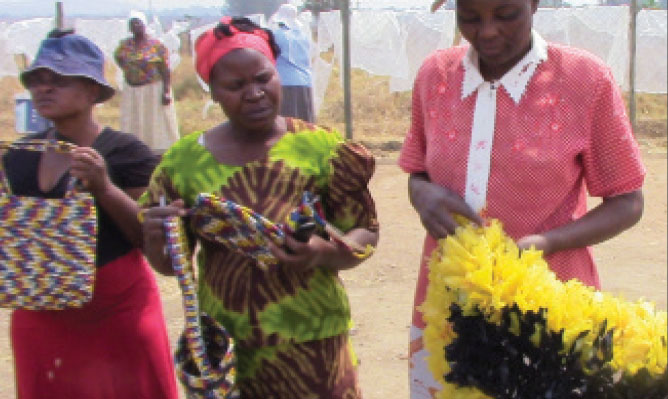
When Getrude Chinoda (54) from Masvingo’s Mucheke highdensity suburb tested positive for HIV in 2008, she resigned herself to fate, waiting for the day she would breathe her last.
BY TATENDA CHITAGU/HAZVINEI MWANAKA
For her, that “grim” discovery was more like a death sentence.
That was the time when Zimbabwe recorded the world’s highest inflation rate outside a war zone, with shortages of basic goods while poverty stalked the populace.

Sleeping on an empty stomach with her three children was the order of the day. The children had stopped going to school because she could not afford the fees. Teachers at the school had either turned into vendors or crossed into neighbouring countries to scrape a living and make ends meet.
“My life was in shambles. I was sick and I had given up hope of living. My kids were suffering and I did not have any source of income and could not turn into vending or anything because of my poor health,” Chinoda said.
With the advent of the coalition government between Zanu PF and the two MDCs a year later, when the economy stabilised, she had access to anti-retroviral drugs (ARVs).
“My health improved and I decided not to live on hand-outs, but do something for myself and send my children to school and provide them with a decent meal and clothes,” she said, flaunting recycled plastics which they pick and wash for sale for recycling.
- Chamisa under fire over US$120K donation
- Mavhunga puts DeMbare into Chibuku quarterfinals
- Pension funds bet on Cabora Bassa oilfields
- Councils defy govt fire tender directive
Keep Reading
Chinoda later hooked up with a group of women and a few men in Masvingo and started a recycling club, thereby helping to keep the city clean by picking up plastics and rags and cleaning them before selling or converting them into wares such as mats.
“Not only am I benefiting in terms of cash, but stigma and discrimination are now things of the past. We relate well with other members. At least here we relieve ourselves as people living with HIV and help each other fend for our families,” she said.
The health clubs started in Masvingo city in 2010 through partnership with a local non-governmental organisation, Zim Ahead. It involves mobilisation of communities to participate directly in waste management.
Other partners include Masvingo City Council, CARE International and the Environmental Management Agency (EMA).
Florence Chiwera of Ward 1, who is also chairperson of the Masvingo Urban Recycling Club, said they started as a volunteering project.
“We started picking papers in our wards as a volunteering project, but later found out that we could make a living out of this. Our club consists of mostly women mainly widows, the elderly who take care of orphans whose parents died of HIV, HIV-positive women and a few men.
“We are now able to manage waste especially at our places of residence. Not only are we making a living out of dirt, but we have helped reduce diseases,” she said.
Commenting on HIV women in their clubs, Chiwera herself an HIV counsellor said the clubs have helped in giving people living with HIV and Aids psycho-social and economic support.
“We also have grocery clubs where we buy each other groceries. Women here not only go home with cash, but they also have enough food to take to their families. At home usually they are lonely because most of them are widows, but here they have time to socialise with others, hence they live a stress-free life,” she said.
She added that they have lessons at their club where they teach about adherence to medication, overcoming stigma and discrimination, among other things.
The club, which mainly washes plastic papers for resale, also makes door mats, bags and other wares from rags. It has signed a memorandum of understanding with a local organisation to which it sells the plastics.
“We have partnered with Clester (Pvt) Ltd and we sell a tonne of plastics to them at $200. The money is not much, but it is better than staying at home and folding your hands, waiting for aid,” Chiwera said.
Adonia Rwatirera, the operations manager at Clester, said they get plastics for recycling from the health clubs.
“At least now they are making a living with plastic which they used to burn that is now giving them cash. We buy plastics from them which we use to make plastic bags, plates and cups,” he said.
“Nowadays they are productive, they spend their time doing something constructive and mostly they are now able to fend for their families.”
EMA provincial head Milton Muusha said the amount of waste that is being generated in most urban areas has been increasing to the point that managing waste has been a big challenge.
“Proper management of waste needs to start with the locals, thus the people that generate the waste, that’s why the health clubs are managing their waste. Masvingo City generates 1 450 tonnes of waste every week within their dumpsite and also managing the waste becomes a problem.
“So this concept of trying to recover some of the waste and assisting communities gaining livelihoods out of it becomes important in sustainable waste management,” he said.
In trying to empower the clubs, they have taken them to a number of forums and exhibitions to expose them on how to market their products, and also link them with potential markets.











